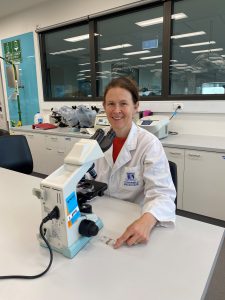no-repeat;left top;;
auto
Reproduction Control Committee member profile – Dr Natali Krekeler
h4

Could you introduce yourself to WSAVA members?
I completed my veterinary medicine degree and subsequently a Doctorate degree in Equine Orthopaedics at the Free University of Berlin, Germany. Afterwards, I commenced a residency in Comparative Theriogenology at Cornell University, USA. I passed the board exam of the American College of Theriogenologists and remained at Cornell for a couple of years as a Clinical Instructor in Theriogenology and postdoctoral associate in Developmental Biology.
In 2011, I completed my PhD degree at the University of Melbourne, where I am a Senior Lecturer in Veterinary Reproduction. My research interests are infectious uterine diseases in domestic animals. We are currently working on the development of a vaccine against pyometra and cystitis in small animals and on the role of the microbiome in fertility in horses. Over the years, I have established international collaborations with researchers in the USA, Denmark, Germany and New Zealand. I teach pre-clinical and clinical Reproduction subjects across all year levels of the DVM degree and into undergrad subjects.
What do you find so interesting about reproduction in companion animals?
Reproduction in companion animals is fascinating for a variety of reasons. I love working with breeders, who are passionate about the health of their breed of dogs. This is also part of my teaching. I have noticed that more students these days are critical of breeders in general and accuse them of just being in it for the money. I disagree. While there is a big problem with breeding for profit (eg ‘puppy farms’) this problem shouldn’t be confused with breeders, who are passionate about the wellbeing of their breed and want a trusting vet-client relationship with the common goal of advancing the breed.
There are many ethical implications around reproduction in companion animals. They are complex and the interests of many different stakeholders must be taken into account. As an academic and member of the WSAVA RCC, I am keen to help develop mutually agreeable solutions.

Why were you keen to join the WSAVA Reproduction Control Committee?
I was keen to join the WSAVA in order to be of service to the field I am passionate about. There is much conflicting practice and advice and we hope to help collate and appraise the available literature and distil it into practical, evidence-based guidelines that veterinarians worldwide can utilize to better companion animal health.
For example, as part of my work, I receive regular enquiries from referring veterinarians and breeders/owners asking for advice about if and when they should be spaying/ neutering the pets in their care. While research in this area is increasing, it is still patchy and often limited to certain breeds and cohorts of pets. It is clear that an international joint-research strategy is needed to collate high-quality data of well-designed prospective studies.
It is necessary to summarize the existing literature, identify knowledge gaps and create novel research hypotheses to address questions around benefits and risks of spaying and neutering, taking breed characteristics and timing of the intervention into account. Novel research projects can then be recommended to address these hypotheses, which will ultimately inform the RCC’s Global Guidelines.
What do you enjoy doing outside work to relax?
I love spending time with my young family. We enjoy being out camping, on the surfboard or on mountain bike trails. I used to run marathons as an excuse to travel to interesting places. I hope that I will return to this once my kids are a bit older and I have a bit more time to train.
Meet the other members of the RCC Committee:
https://wsava.org/committees/reproduction-control-committee/
